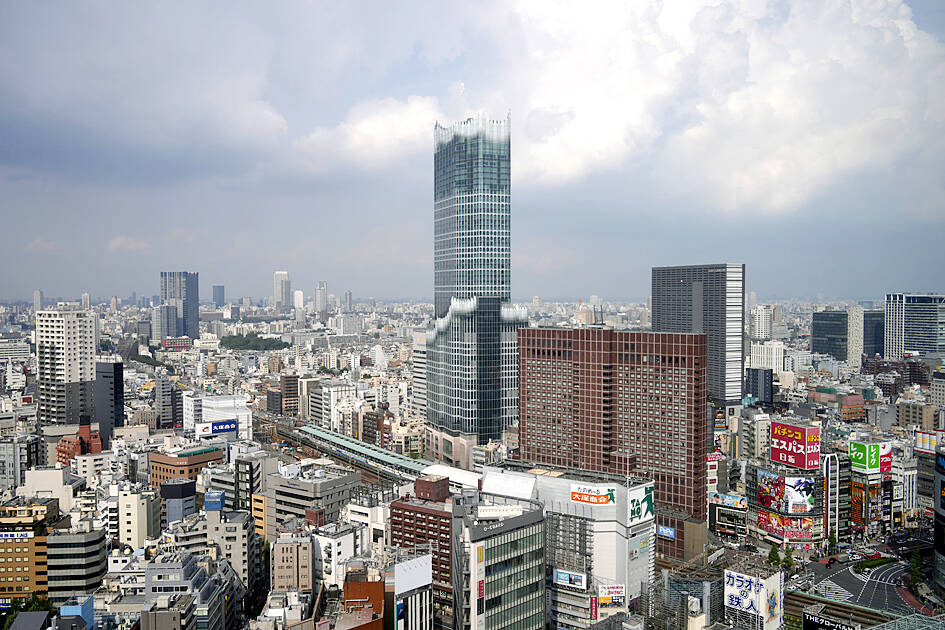Singapore became the biggest investor in Japan’s real-estate sector this year, charmed by the yen’s weakness and growing demand in the logistics and hospitality industries, Knight Frank LLP said.
Inflows from the city-state have totaled about US$3 billion so far this year, followed by investors from the US, Canada and the United Arab Emirates, a report published earlier this month said.
Singapore’s sovereign wealth fund GIC Pte’s purchase of six warehouses in Japan from Blackstone Inc for US$800 million contributed greatly to that, Knight Frank’s Asia-Pacific research head Christine Li (李敏雯) said.

Photo: EPA-EFE/FRANCK ROBICHON
GIC chief investment officer Jeffrey Jaensubhakij recently described Japan as a “very cheap” market where value can be realized, and with a long way to run. International investors are also attracted to its low borrowing costs, and investing more into hotels because of a post-COVID-19 tourism boom.
Foreign investors, including Goldman Sachs Group Inc, KKR & Co and Blackstone have spent a combined US$2 billion on hotel deals in Japan this year, more than any other sector in Asian commercial property, MSCI said.
Japan’s surge in hybrid work arrangements and rising supply has eroded investors’ appetite for office spaces, Knight Frank said.
Separately, the Japanese government would implement policies to boost part-time workers’ take-home pay to tackle labor shortages, the Yomiuri newspaper reported yesterday, without saying its source.
The government would also pay up to ¥500,000 (US$3,370) per employee to companies that have more than 100 employees with plans to raise wages or extend working hours.

The US dollar was trading at NT$29.7 at 10am today on the Taipei Foreign Exchange, as the New Taiwan dollar gained NT$1.364 from the previous close last week. The NT dollar continued to rise today, after surging 3.07 percent on Friday. After opening at NT$30.91, the NT dollar gained more than NT$1 in just 15 minutes, briefly passing the NT$30 mark. Before the US Department of the Treasury's semi-annual currency report came out, expectations that the NT dollar would keep rising were already building. The NT dollar on Friday closed at NT$31.064, up by NT$0.953 — a 3.07 percent single-day gain. Today,

‘SHORT TERM’: The local currency would likely remain strong in the near term, driven by anticipated US trade pressure, capital inflows and expectations of a US Fed rate cut The US dollar is expected to fall below NT$30 in the near term, as traders anticipate increased pressure from Washington for Taiwan to allow the New Taiwan dollar to appreciate, Cathay United Bank (國泰世華銀行) chief economist Lin Chi-chao (林啟超) said. Following a sharp drop in the greenback against the NT dollar on Friday, Lin told the Central News Agency that the local currency is likely to remain strong in the short term, driven in part by market psychology surrounding anticipated US policy pressure. On Friday, the US dollar fell NT$0.953, or 3.07 percent, closing at NT$31.064 — its lowest level since Jan.

Hong Kong authorities ramped up sales of the local dollar as the greenback’s slide threatened the foreign-exchange peg. The Hong Kong Monetary Authority (HKMA) sold a record HK$60.5 billion (US$7.8 billion) of the city’s currency, according to an alert sent on its Bloomberg page yesterday in Asia, after it tested the upper end of its trading band. That added to the HK$56.1 billion of sales versus the greenback since Friday. The rapid intervention signals efforts from the city’s authorities to limit the local currency’s moves within its HK$7.75 to HK$7.85 per US dollar trading band. Heavy sales of the local dollar by

The Financial Supervisory Commission (FSC) yesterday met with some of the nation’s largest insurance companies as a skyrocketing New Taiwan dollar piles pressure on their hundreds of billions of dollars in US bond investments. The commission has asked some life insurance firms, among the biggest Asian holders of US debt, to discuss how the rapidly strengthening NT dollar has impacted their operations, people familiar with the matter said. The meeting took place as the NT dollar jumped as much as 5 percent yesterday, its biggest intraday gain in more than three decades. The local currency surged as exporters rushed to